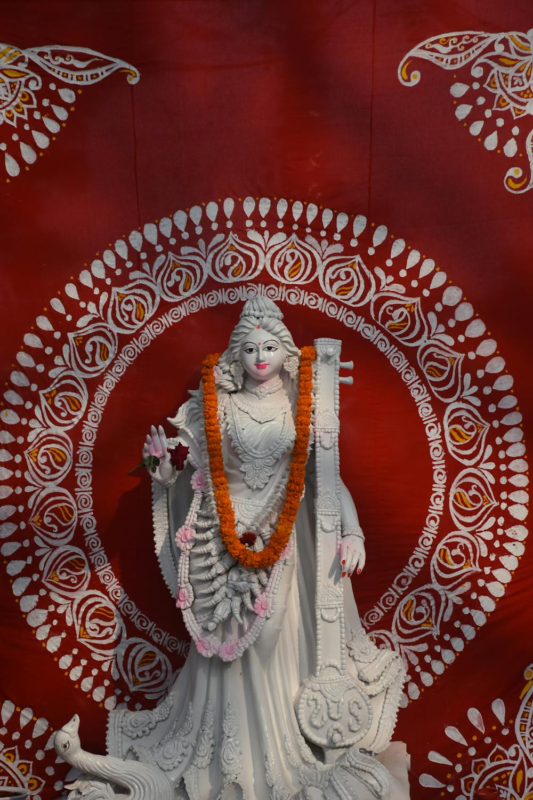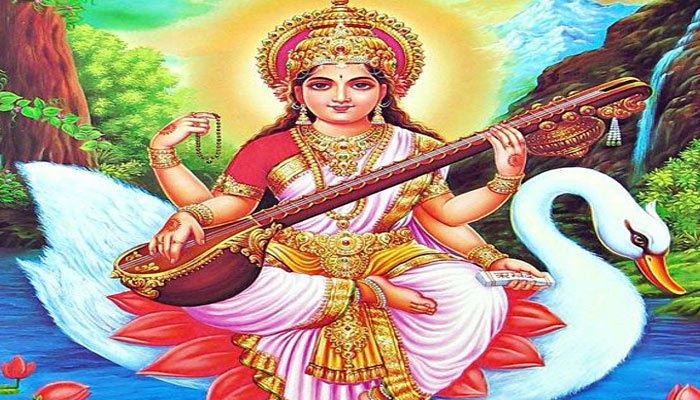During the Diwali festival, Goddess Lakshmi and Lord Ganesha are worshipped, but Goddess Saraswati also holds special importance. In Hinduism, Goddess Saraswati is considered the deity of knowledge, wisdom, and intellect. It is believed that her worship bestows intelligence, discernment, and knowledge. Goddess Saraswati is also known as Sharda, and in Gujarat, her worship is celebrated as Sharda Puja. Let’s explore the significance and story behind Sharda Puja.

Table of Contents
Significance of Sharda Puja
Goddess Saraswati, also known as Sharda, is revered in Hinduism. According to Hindu beliefs, wealth and prosperity bestowed by Goddess Lakshmi remain with a person only when they possess knowledge and wisdom. Hence, worshipping both Goddess Lakshmi and Goddess Saraswati during Diwali is considered essential. Without knowledge and intellect, wealth and prosperity do not stay for long. Therefore, special worship of Goddess Sharda is also performed on Diwali. This puja is significant not only for students but also for business people, especially in Gujarat, where it is known as Chopda Puja.

How to Perform Sharda Puja
Worshipping Maa Sharda is believed to be highly beneficial. When performed with complete devotion, it bestows blessings of knowledge, intellect, and prosperity. To perform Sharda Puja, start by bathing and wearing clean clothes. Take a clean platform, sprinkle it with holy water, and purify it. Place a white cloth on the platform and install pictures or idols of Lord Ganesha, Goddess Lakshmi, and Goddess Sharda. Offer white or yellow flowers, apply white sandalwood paste, and offer sweets to Goddess Sharda. Installing a ‘Saraswati Yantra’ in the puja is considered especially auspicious. This puja should be performed in the evening, beginning with Lord Ganesha’s worship, followed by worshipping Maa Sharda. During the puja, chant the mantra “Om Hreem Aing Hreem Saraswatyai Namah.”

While worshipping Maa Sharda, it is also considered auspicious to worship her musical instrument and books. Afterward, offer curd, halwa, and saffron-mixed sugar to Goddess Saraswati. End the puja by performing her aarti and seeking forgiveness for any mistakes made during the worship.
The Story of Sharda Puja
According to ancient tales, once Lord Vishnu instructed Lord Brahma to create the universe. After creating all beings, especially humans, Brahma felt unsatisfied, sensing that something was still missing because silence surrounded the universe. Brahma shared this with Vishnu, who granted him permission to sprinkle water from his kamandalu (holy pot). When the water touched the earth, a beautiful four-armed goddess emerged from a tree, holding a veena and a book and mala in her hands. Brahma asked her to play the veena, and as she did, all living beings received the gift of speech. Sounds filled the rivers and rustling arose from the wind. Brahma named this goddess Saraswati, also known as Bagheswari, Bhagwati, Sharda, Veenavadini, and Vag Devi.

Benefits of Sharda Puja
According to Hindu beliefs, worshipping Maa Sharda is considered highly auspicious. On this day, devotees perform the puja of Goddess Saraswati with complete devotion. Sharda Puja is especially fruitful for both students and businesspeople. For students, it brings knowledge and wisdom, and for businesspeople, it grants prosperity and wealth.







